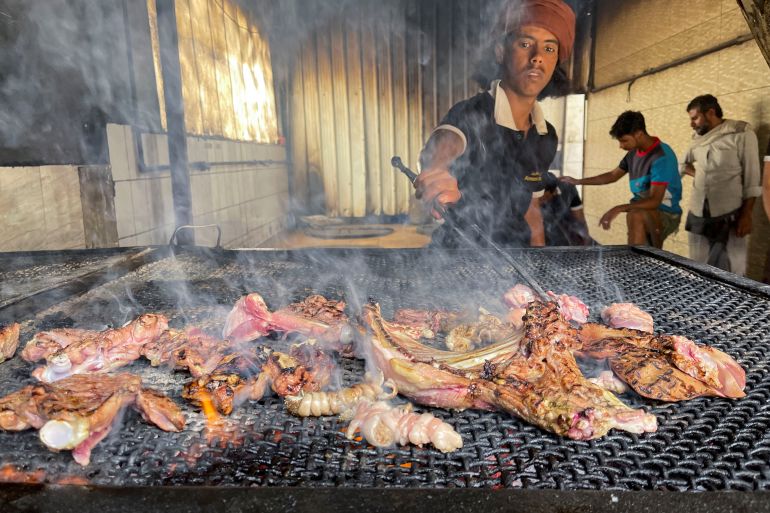After months of calm, Yemen looks anxiously to the new year
A six month truce set the tone for 2022, with Yemen’s warring parties largely avoiding direct conflict. With that deal falling apart, what will 2023 bring?

Sanaa, Yemen – When 2022 began, and with war raging in his home country Yemen, Abdu felt that there was only one way for him to make money and help his family.
The 25-year-old packed his bags, left the Yemeni capital Sanaa, and headed north.
Keep reading
list of 3 itemsUS Navy says trawler carrying arms haul was bound for Yemen
‘Relish this moment, forget about the war’: Yemenis on World Cup
“Out of despair, I decided at the start of the year to travel to Saudi Arabia to find work,” Abdu said, with a deep sigh as he remembered his trip to the kingdom, Yemen’s richer neighbour, which had also spent several years conducting air attacks across Yemen in support of the government.
Abdu did not apply for a work visa because he could not afford it. Like many others, he instead turned to smugglers to reach his destination, the southern Saudi city of Khamis Mushait, 12 hours away.
“I arrived there in the second week of January [2022]. I found a job as a shepherd. And I started receiving 1,500 Saudi riyals ($399) monthly,” Abdu told Al Jazeera.
But only three months after Abdu’s arrival in Saudi Arabia, his own expectations for how the year would pan out for Yemen were upended.
In April, the Iran-allied Houthi rebels, who control Sanaa and other major population centres in Yemen’s north, and the Yemeni government agreed to a United Nations-sponsored truce. Saudi air attacks also stopped. The war largely receded, frozen and temporarily out of sight. Life, to a relative degree, improved.
The truce held for six months, despite repeated violations. Fuel ships arriving at the Houthi-controlled Hodeidah port quadrupled. Commercial flights to and from Sanaa International Airport resumed for the first time since 2016, enabling thousands of passengers, mainly patients and students, to fly abroad, or return home.
According to Save the Children, conflict-attributable child fatalities dropped by 34 percent and displacement was roughly halved.
It meant that Abdu was able to think of the previously unthinkable – the possibility that he might be able to prosper financially in Yemen.
“I called my father after I heard the news of the ceasefire, and he was glad that fuel ships were going to arrive and that air attacks would stop,” Abdu recalled, explaining that for his father, a bus driver, the prospect of lower fuel prices and a more plentiful supply meant the chance to finally make more money.
And so, with 12,000 Saudi Riyals ($3,191) from his work in Saudi Arabia in his back pocket, Abdu has returned to Yemen. His plan is to buy a minibus and stay in Sanaa, joining his father as a bus driver.
Truce falls through
So far, Abdu has no regrets. He feels the situation in Sanaa is better than when he left; the fighting remains largely stopped and fuel is available.
Nonetheless, he still worries about a possible renewed outbreak of violence or a new fuel crisis.
That possibility is not far-fetched.
In October, UN Special Envoy to Yemen Hans Grundberg failed to get the Houthis to agree to renew the truce, despite agreement from the Yemeni government, and there was no extension.
While there has not been a return to all-out war, the Houthis have conducted drone attacks on the al-Dhabba oil terminal in the government-controlled Hadramout governorate, raising alarm and drawing a rebuke from the UN.
Ultimately, according to the Yemeni political researcher and author Adel Dashela, long-term stability in Yemen remains unattainable.
As the new year begins, he predicts three scenarios for Yemen.
“The regional powers may unanimously push Yemen’s warring sides to negotiate a lasting peaceful solution. But such a scenario is far-fetched given the Houthi stubbornness and the southern separatists’ inflexibility,” Dashela said, referring to the Southern Transitional Council, which, while officially part of the Saudi-led coalition that backs the government, has fought against government forces in the past and is in de facto control of the port city of Aden.
The second scenario is the perpetuation of the status quo, with the Houthi group ruling the north while the government and the secessionists control the south. “This seems less violent,” Dashela said. “However, it will expand and tighten the influence of the militant groups in the country.”
The breakout of an all-out war is the third scenario. “This is the most dangerous direction and will further devastate Yemen,” believes Dashela. “All indicators show that peace will not be fulfilled easily given the conflict’s complexity and the regional players’ hegemony.”
It is a scenario that leaves the lives of millions of Yemenis hanging in the balance.
For now, Abdu still believes that he made the right decision to come back to Yemen.
“The warlords can keep negotiating for months or years,” he said. “I don’t mind, I would just hate to see a war or fuel crisis.”
“2022, the good year, is over,” he added. “We don’t know what 2023 holds.”